Thai Travel Clinic

Hospital for Tropical Diseases Faculty of Tropical Medicine, Mahidol University
- Career Opportunities
- Pre-Travel Counseling
- Vaccination
- Malaria Checking
- Rabies Post-exposure Rx
- Traveler's diarrhea Rx
- Medical Treatment
- COVID-19 Vaccine Passport
- Available vaccines in our clinic
- Useful articles for travelers
- Research Activities
- Publications
- Volunteer/Elective
- หลักสูตรแพทย์ประจำบ้าน
- Location of our clinic
- Make an appointment
- Frequently Asked Questions
- Terms of Services
Appointment for vaccine/consultation
- Teleconsultation
Traditional Thai Massage *New*
Covid vaccine passport
ข้อมูลวิชาการสำหรับแพทย์
Latest news.
- Travel Clinic - Extended service
- FLAVI-EXPAT Research
- หนังสือเวชศาสตร์การเดินทางและท่องเที่ยว
- New Feature: Notification list
- Availability of Malarone
Highlighted Article
- FAQ about travelers' diarrhea
- FAQ about malaria
- Dengue hemorrhagic fever
Search in this site
We have 36 guests and no members online
Welcome to Thai Travel Clinic
Thai Travel Clinic is a special clinic of Hospital for Tropical Diseases , Faculty of Tropical Medicine , Mahidol university, Thailand. We provide comprehensive medical care for both Thai and Foreign travelers. Our services include: pre and post travel counseling, recommendation of travel vaccines, malaria protection and prophylaxis as well as diagnosis and treatment of tropical diseases.
Moreover, as an university hospital in Mahidol University, we play major roles in education and research. Our staffs participate as lecturers in various educational courses including DTM&H, MCTM, MSc and Ph.D (TropMed). We are also the first university hospital that could run the Residency Training in Preventive Medicine (Travel Medicine) for doctors. Apart from that, we also have collaborated with many tropical/travel medicine institutes all around the world. So each year, we have the privilege to welcome many medical students, doctors, residents, and professors from many countries.
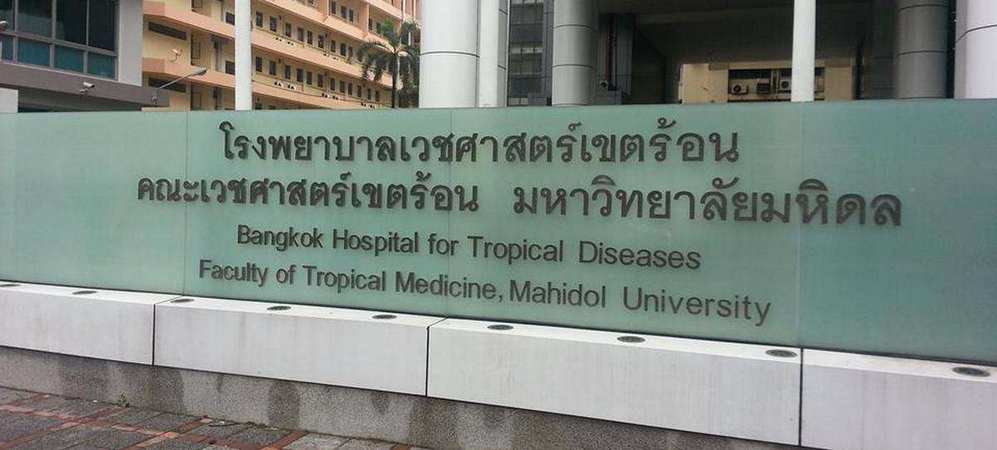
Our clinic is the part of the Hospital for Tropical Diseases, Mahidol University
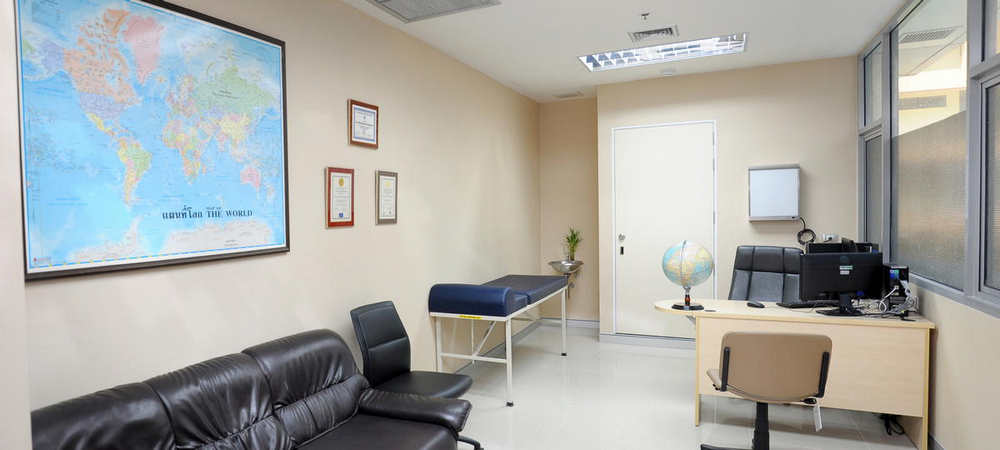
Inside our travel clinic
Main consultation room in our travel clinic
https://www.thaitravelclinic.com/images/slideshow/hos1.jpg
https://www.thaitravelclinic.com/images/slideshow/TC1.jpg
Our website uses cookies to provide you with a better online experience.
By using our website, you agree to our use of cookies. Learn more
Frequently used information


- Medical Tourism
- Thailand medical tourism
- Hospitals in Thailand
Thai Travel Clinic - Hospital for Tropical Diseases
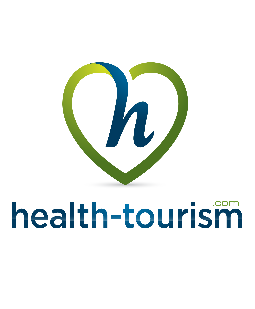
Bangkok, Thailand
- Contact Hospital
Thai Travel Clinic - Hospital for Tropical Diseases - Overview
Our Travel Clinic is part of the Hospital for Tropical diseases, Faculty of Tropical Medicine, Mahidol University. We are specialized in Travel Medicine and Tropical diseases especially malaria. Our services include: pre and post travel counseling, vaccination and immunization, malaria protection and prophylaxis.
- Transportation services
Facilities:
- Cafeteria/restaurant
- Number of beds: 250
- Year established: 1961
Browse by specialty - Thailand hospitals and clinics
Quick links.
- Advertising
- How it Works
- Destinations
- Information
- Terms of use
Featured Cities
- Buenos Aires
- Kuala Lumpur
- Petaling Jaya
Featured Specialties
- Cancer Treatment
- Cardiac Surgery
- Cosmetic Surgery
- Fertility Treatment
- Orthopedic Surgery
- View More Specialties

Copyright © 2008 - 2024 Health-Tourism.com, All Rights Reserved
- Quick Links
- Make An Appointment
- Our Services
- Price Estimate
- Price Transparency
- Pay Your Bill
- Patient Experience
- Careers at UH
Schedule an appointment today

Thailand Travel Requirements & Vaccinations
Thailand is a country located in Southeast Asia on the Indochinese peninsula. Officially known as the Kingdom of Thailand, it was formerly known as Siam. Thai is the official language of Thailand with English being spoken in most of the larger cities and tourist destinations. Thailand is home to some of the most popular and luxurious resorts in Asia.
The terrain of Thailand varies greatly and ranges from mountainous regions in the north, to plateaus in the east and river valleys in much of the interior. Despite the geographical variations, most of Thailand experiences a tropical wet and dry (savanna) climate which is comprised of three distinct seasons:
- Summer or pre-monsoon season lasts from mid-February to mid-May and is characterized by warm, dry temperatures.
- Rainy or southwest monsoon season lasts from mid-May to mid-October and is defined by an abundance of rain.
- Winter or northeast monsoon season is mid-October through mid-February and comes with dry, mild weather conditions.
Thailand has a vast array of attractions and activities to offer visitors, including:
- Bangkok and the many historical, natural and cultural sights it has to offer
- Trekking and adventure travel in the forested mountain regions
- Archaeological sites, Buddhist temples and museums
- Clear blue/green shallow waters on sandy beaches along the coast
- A diverse wildlife system
Recommended Vaccinations for Thailand Travel
- Hepatitis A
- Japanese encephalitis
*Rabies vaccination is typically only recommended for very high risk travelers given that it is completely preventable if medical attention is received within 7 – 10 days of an animal bite.
Travelers may also be advised to ensure they have received the routine vaccinations listed below. Some adults may need to receive a booster for some of these diseases:
- Measles, mumps and rubella (MMR)
- Tdap (tetanus, diphtheria and pertussis)
Older adults or those with certain medical conditions may also want to ask about being vaccinated for shingles and/or pneumonia.
This information is not intended to replace the advice of a travel medicine professional. Not all of the vaccines listed here will be necessary for every individual.
Talk to the experts at UH Roe Green Center for Travel Medicine & Global Health to determine how each member of your family can obtain maximum protection against illness, disease and injury while traveling, based on age, health, medical history and travel itinerary.
Make an Appointment
To schedule a pre-travel consultation call, 440-482-7416 .
Please note: You must be physically located in Ohio for a virtual consultation
What Can You Do to Help?
Make a gift to support urgent patient care at University Hospitals.
Travel Vaccines and Advice for Thailand

Thailand is a popular destination with its tropical climate, food, culture and beaches.
Thai is the official language of Thailand. But, other smaller languages spoken in rural areas. The primary religion of Thailand is Buddhism and is prevalent in many aspects of culture throughout Thailand. Islam is also practiced in Southern provinces.
Bangkok, Thailand’s capital city, is also the largest city in the country. Bangkok is highly populated with congested streets, modern buildings and temples. It is most known for its nightlife.
Thailand’s other major cities include Ayutthaya, Chiang Mai, and Chiang Rai.
Do I Need Vaccines for Thailand?
Yes, some vaccines are recommended or required for Thailand. The PHAC and WHO recommend the following vaccinations for Thailand: hepatitis A , hepatitis B , typhoid , cholera , yellow fever , Japanese encephalitis , rabies , meningitis , polio , measles, mumps and rubella (MMR) , Tdap (tetanus, diphtheria and pertussis) , chickenpox , shingles , pneumonia and influenza .
See the bullets below to learn more about some of these key immunizations:
- Hepatitis A – Food & Water – Recommended for most travellers
- Hepatitis B – Blood & Body Fluids – Accelerated schedule available
- Typhoid – Food & Water – Shot lasts 2 years. Oral vaccine lasts 5 years, must be able to swallow pills. Oral doses must be kept in refrigerator.
- Cholera – Food & Water – Cholera is rare, but present in Thailand. Vaccination is recommended for travellers at increased risk or visiting areas with active transmission.
- Yellow Fever – Mosquito – Required if travelling from a country with risk of yellow fever transmission
- Japanese Encephalitis – Mosquito – Recommended depending on itinerary and activities. May be given to short- and extended-stay travellers, recurrent travellers and travel to rural areas. Present throughout country, especially northern regions. Most cases from May to October.
- Rabies – Saliva of Infected Animals – High risk country. Vaccine recommended for long-term travellers and those who may come in contact with animals.
- Measles Mumps Rubella (MMR) – Various Vectors – Given to anyone unvaccinated and/or born after 1957. One time adult booster recommended.
- TDAP (Tetanus, Diphtheria & Pertussis) – Wounds & Airborne – Only one adult booster of pertussis required.
- Chickenpox – Direct Contact & Airborne – Given to those unvaccinated that did not have chickenpox.
- Shingles – Direct Contact – Vaccine can still be given if you have had shingles.
- Pneumonia – Airborne – Two vaccines given seperately. All 65+ or immunocompromised should receive both.
- Influenza – Airborne – Vaccine components change annually.
- Meningitis – Airborne & Direct Contact – Given to anyone unvaccinated or at an increased risk, especially students.
- Polio – Food & Water – Considered a routine vaccination for most travel itineraries. Single adult booster recommended.
See the tables below for more information:
Various mosquito-borne diseases are present in Thailand. Malaria poses a threat to travellers to some regions of the country. Make sure you are protected with antimalarials.
Dengue , Zika and chikungunya can also be found in Thailand. While there are no vaccines available for these diseases, there are steps you can take to prevent them. Be sure to use mosquito repellents, netting and wear proper clothing.
Medical treatment is adequate and common in urban areas. Healthcare is also available in rural areas, though the health care providers may not speak English.
To find out more about these vaccines, see our vaccinations page . Ready to travel safely? Book your appointment either call or start booking online now .
Customer Reviews
Passport health – travel vaccines for thailand, do i need a visa or passport for thailand.
If you are entering Thailand for tourism purposes under a 30-day period, you do not require a visa. All Canadian citizens must have a valid passport upon arrival. For those travelling to Thailand for business purposes, a business visa is required.
Sources: Embassy of Thailand and Canadian Travel and Tourism
Always carry your passport and visa with you to avoid arrest in Thailand.
Visit the Canadian Travel and Tourism website for more information on entry and exit requirements.
What is the Climate Like in Thailand?
Thailand is a country with a tropical climate that is hot and humid throughout the year. The temperature ranges from 25 to 35 degrees Celsius during the day. The weather can be different depending on where you are in Thailand. Here are some popular tourist destinations:
- Bangkok : Bangkok is hot and humid all year round. It rains a lot, especially between May and October.
- Phuket : Phuket is a tropical place. It can rain a lot from May to October. The temperature is usually between 75 and 90 degrees.
- Chiang Mai : Chiang Mai has a tropical climate with three different seasons: cool, hot, and rainy. The cool season runs from November to February, the hot season from March to May, and the rainy season from June to October.
- Pattaya : Pattaya is hot and humid all year round. It rains a lot, especially between May and October.
- Koh Samui : Koh Samui is an island that has two different seasons: dry and rainy. The dry season runs from December to April, and the rainy season from May to November.
Remember that weather can change, so always check the forecast before you travel.
How Safe is Thailand?
In the past few years, there have been periodic terrorist attacks at popular tourist attractions in Thailand,. This remains a high-concern today. There is an ongoing risk of terrorist attacks in Thailand.
The National Council for Peace and Order (NCPO) has placed strict restrictions on media and have banned political gatherings. Tourists may be detained by the military for openly criticizing the NCPO.
Pick-pocketing is common in Thailand as is sexual violence in bars and isolated areas.
Do not use your passport as collateral. Many rental places are scams.
In Southern Thailand (Yala, Pattani, Narathiwat, and Songkhla), martial law is still prevalent. Tourists are cautioned against travelling to these areas.
Temples in Thailand
There are over 40,000 temples in Thailand, making them popular tourist attractions. These temples range in age and architecture and many are still in use today.
Wat Pho, located in Bangkok, is one of the most popular due to its size and attractions within. It is one of the largest complexes in the country, holding many buildings. Wat Pho houses the largest reclining Buddha and largest collection of Buddha images.
The site is also headquarters for the teaching and preservation of Thai medicine. There, tourists can find two massage schools and pavilions.
You must take off your shoes to enter and you purchase coins to put into bowls for good luck. All the money goes towards renovating and upkeeping the site.
What Should I Take To Thailand?
Thailand is a hot and humid country, it’s important to pack lightweight and comfortable clothing. You should bring comfortable shoes for walking, sun protection like sunscreen, hats, and sunglasses to avoid the strong sun rays. Mosquitoes are common in Thailand, so it’s important to bring insect repellent to avoid bites.
Thailand uses different types of electrical outlets, so it’s recommended to bring a universal adapter. It’s also recommended to pack any prescription medication and over-the-counter medications such as pain relievers, anti-diarrhea medication, and motion sickness medication.
Thailand is a cash-based society, so it’s important to bring cash and credit cards. If you plan to visit the beaches or go swimming, don’t forget to pack swimwear and a beach towel. When visiting temples or other religious sites, make sure to dress respectfully, covering your shoulders and knees, and avoid wearing revealing clothing in public places.
Don’t forget to bring your passport, visa (if required), travel insurance, and any other important travel documents.
Canadian Embassy in Thailand
Canadian consular services can help travellers with many issues they may face including passport services. Once in Thailand, the information for the Canadian Embassy is:
Canadian Embassy Bangkok 15th Floor, Abdulrahim Place, 990 Rama IV, Bangrak, Bangkok, 10500, Thailand Tel.: +66 0 2646 4300
If you have any questions about travelling to Thailand or are wondering what shots you may need for your trip, schedule an appointment with your local Passport Health travel medicine clinic. Call us at or book online now! and protect yourself today.
On This Page: Do I Need Vaccines for Thailand? Do I Need a Visa or Passport for Thailand? What is the Climate Like in Thailand? How Safe is Thailand? Temples in Thailand What Should I Take To Thailand? Canadian Embassy in Thailand

- PIPEDA Policy and Consent Form
- Privacy Policy
- Automatic Data Collection Statement
BNH Travel Clinic
- Bangkok and surrounds
While not the stuff that office escape daydreams are made of, getting medically protected while travelling is an important consideration. Travelling with a bit of stomach flu is possible, but travelling with malaria is not. If you’ve left home without arranging malaria treatment or have made a mid-journey change of destination that carries a higher-risk of a tropical disease, there is an excellent place in Bangkok to turn to for preventive medical treatment: BNH Travel Clinic.
More on Bangkok
- Accommodation

Drugs. The boring kind.
What might you need to be protected against? Well, depending on where you are going it can vary quite a bit, but if you are planning on hiking or trekking in remote areas of Laos, northern Thailand, or Burma, malaria may be of concern , and rabies vaccinations are recommended for anyone spending time in any rural area in Southeast Asia. Thailand carries a high risk of hepatitis B and typhoid fever, both of which can be vaccinated against. Depending on your itinerary, risk factors and medical history, you might need other vaccinations as well (or fewer, if you are mainly staying in the cities and on the beach). BNH Travel Clinic can advise travellers on the correct precautions.
Malaria according to BNH Travel Clinic (Map courtesy of BNH Travel Clinic)
Do also read our above-mentioned piece on malaria in Southeast Asia — depending on where you are specifically going, prevention through mosquito nets, sensible clothing, mosquito coils and so on may be all you need — don’t get steamrolled into buying malarials. It is unlikely that visitors to Thailand need them unless they’re planning on spending protracted spells along the Burmese border for example.
BNH Travel Clinic is located in Silom , a short walk from the Sala Daeng BTS Station or the Silom MRT Station, on Soi Convent. No appointment is necessary, and the clinic is staffed with specially trained nurse-practitioners who are aware of the region’s medical risks. Treatment is quite reasonably priced, often being cheaper than identical treatment abroad (especially if you come from a country that doesn’t have national health care: looking at you, America).
BNH Travel Clinic BNH Hospital, 9/1 Convent Rd T: (02) 686 2700 Open Mon-Sat, 08:00-17:00 and Sunday
Reviewed by Brock Kuhlman
Further reading
General ideas, health & safety, money & costs, do’s & dont’s, visas & immigration, weather & climate.
5 other destinations in Bangkok and surrounds

Go back in time

Ruins and rivers

A low-key, non-tourist town

Chachoengsao
Temples and Thai sweets

Nakhon Pathom
Now that is a chedi
Cookies on GOV.UK
We use some essential cookies to make this website work.
We’d like to set additional cookies to understand how you use GOV.UK, remember your settings and improve government services.
We also use cookies set by other sites to help us deliver content from their services.
You have accepted additional cookies. You can change your cookie settings at any time.
You have rejected additional cookies. You can change your cookie settings at any time.
- Passports, travel and living abroad
- Travel abroad
- Foreign travel advice
Before you travel check that:
- your destination can provide the healthcare you may need
- you have appropriate travel insurance for local treatment or unexpected medical evacuation
This is particularly important if you have a health condition or are pregnant.
Emergency medical number
Dial 1669 and ask for an ambulance.
Contact your insurance or medical assistance company promptly if you’re referred to a medical facility for treatment.
Vaccinations and health risks
At least 8 weeks before your trip check:
- the latest information on vaccinations and health risks in TravelHealthPro’s Thailand guide
- where to get vaccines and whether you have to pay on the NHS travel vaccinations page
Health risks in Thailand include:
- dengue fever
See the ‘Other risks’ section of the TravelHealthPro Thailand guide for more on health risks .
To avoid mosquito-borne viruses, such as dengue fever and Zika virus, take steps to avoid being bitten by mosquitoes.
Air quality
There can be high levels of air pollution in large cities. This includes Bangkok and Chiang Mai, which are also affected by seasonal regional smoke haze from the burning of trees. The high pollution and particulate count sometimes reach dangerous levels. This may worsen bronchial, sinus or asthma conditions.
Check air quality levels for many cities on the World Air Quality Index website .
The legal status and regulation of some medicines prescribed or bought in the UK can be different in other countries.
Hospitals and pharmacies across Thailand will usually accept UK prescriptions. Brand name medication can often be more expensive than locally produced medication.
Medication sold on the street may not be genuine or may have been stolen. Taking medication without medical advice or a prescription can have serious health consequences.
Read best practice when travelling with medicines on TravelHealthPro . The NHS has information on whether you can take your medicine abroad .
Healthcare facilities in Thailand
FCDO has a list of English-speaking doctors in Thailand . All hospitals require guarantee of payment before treating patients. Make sure you have adequate health insurance.
Private hospitals in Thailand are of a high standard but can be expensive. Public hospitals and clinics do not always meet UK standards, particularly outside Bangkok.
COVID-19 healthcare in Thailand
Check the latest information on risk from COVID-19 risk for Thailand on TravelHealthPro .If you have severe symptoms, or any questions related to COVID-19, while in Thailand, call the Thai COVID-19 Hotline on 1422. There is more information on the PR Thai Government Facebook page .
Travel and mental health
Read FCDO guidance on travel and mental health . There is also mental health guidance on TravelHealthPro .
Related content
Is this page useful.
- Yes this page is useful
- No this page is not useful
Help us improve GOV.UK
Don’t include personal or financial information like your National Insurance number or credit card details.
To help us improve GOV.UK, we’d like to know more about your visit today. We’ll send you a link to a feedback form. It will take only 2 minutes to fill in. Don’t worry we won’t send you spam or share your email address with anyone.
- Travel Clinic
- Health Checks & Blood Tests
- Family Health
- Sexual Health
- Aesthetic Clinics
- Occupational Health
- Pricing List
- Login / Register
- Online Booking

Find a Clinic
- MK test Home
- Travel vaccinations >
Travel Vaccinations for Thailand
Vaccinations, certificate requirements.
If you arrive from a yellow fever country you may need a yellow fever certificate.
How much will it cost?
Recommended for all travellers.
The vaccines in this section are recommended for all travellers visiting the country.
The tetanus vaccine - or a booster - is recommended for all travellers who are planning to visit a country where access to medical assistance may be limited. You can get tetanus when tetanus bacteria get into your bloodstream, usually due to injury or a wound. You need a booster if your last tetanus jab was over ten years ago.
Why do I need a consultation?
It is difficult to say which vaccines you need without asking a medical professional. Your itinerary, your medical history and the activities you have planned all affect which vaccinations you need. It is important that a trained travel nurse or pharmacist checks what you need.
Exactly the travel vaccinations you need - no more, no less.
During your consultation, our nurse or pharmacist will talk you through the health risks at your travel destinations to check which vaccines you need. If a vaccine is not essential, we will explain your options so you can decide whether you would like to have it.
Malaria is a serious and sometimes fatal disease transmitted by mosquitoes. You cannot be vaccinated against malaria.
Malaria Precautions
Thailand is a malaria region. Malaria primarily affects forested areas near the borders but it also affects Surat Thani province and parts of the southern border with Malaysia.The risk in most cities is classed as low to no risk.The nurse or pharmacist will assess whether you need malaria tablets based on your travel itinerary. You need to practise insect bite avoidance in all areas.The recommended malaria tablets for travellers going to risk areas in Thailand are Malarone and Doxycycline.
Find your nearest clinic
Check which of our 60+ clinics is closest to you

View all clinics
How it works
1 book an appointment.
Book online or call our booking line. Our lines are open every day!
2 Attend Consultation
During your appointment, the nurse or pharmacist will assess which vaccines or medications you need.
3 Get your treatment
Once our health advisor has assessed your needs, you'll receive your vaccinations & treatments straight away.
How it Works
Book an appointment online, attend your consultation, get your treatment, what our customers think, popular destinations, south africa.
- COUNTRY INFORMATION
- LATEST NEWS
- OUTBREAK SURVEILLANCE
- TOPICS IN BRIEF
- FACTSHEETS & RESOURCES
- WORLD OVERVIEW

Capital City: Bangkok
Official Languages: Thai
Monetary Unit: baht (THB)
- General Information
- Vaccine Recommendations
- Other Risks
TRAVEL RESTRICTIONS ARE IN PLACE FOR THIS COUNTRY
There are entry requirements for anyone who plans to travel to England from this country. Please check here for further information. Advice may vary in Scotland, Wales, and Northern Ireland.
The information on these pages should be used to research health risks and to inform the pre-travel consultation.
Due to COVID-19, travel advice is subject to rapid change. Countries may change entry requirements and close their borders at very short notice. Travellers must ensure they check current Foreign, Commonwealth & Development Office (FCDO) travel advice in addition to the FCDO specific country page (where available) which provides additional information on travel restrictions and entry requirements in addition to safety and security advice.
Travellers should ideally arrange an appointment with their health professional at least four to six weeks before travel. However, even if time is short, an appointment is still worthwhile. This appointment provides an opportunity to assess health risks taking into account a number of factors including destination, medical history, and planned activities. For those with pre-existing health problems, an earlier appointment is recommended.
All travellers should ensure they have adequate travel health insurance .
A list of useful resources including advice on how to reduce the risk of certain health problems is available below.
- Food and water hygiene
- Insect and tick bite avoidance
- Personal safety
- Sexually transmitted infections
- Sun protection
Details of vaccination recommendations and requirements are provided below.
All travellers
Travellers should be up to date with routine vaccination courses and boosters as recommended in the UK . These vaccinations include for example measles-mumps-rubella (MMR) vaccine and diphtheria-tetanus-polio vaccine.
Country-specific diphtheria recommendations are not provided here. Diphtheria tetanus and polio are combined in a single vaccine in the UK. Therefore, when a tetanus booster is recommended for travellers, diphtheria vaccine is also given. Should there be an outbreak of diphtheria in a country, diphtheria vaccination guidance will be provided.
Those who may be at increased risk of an infectious disease due to their work, lifestyle choice, or certain underlying health problems should be up to date with additional recommended vaccines. See the individual chapters of the 'Green Book' Immunisation against infectious disease for further details.
Certificate requirements
Please read the information below carefully, as certificate requirements may be relevant to certain travellers only. For travellers further details, if required, should be sought from their healthcare professional
- There is no risk of yellow fever in this country, however, there is a certificate requirement.
- Under International Health Regulations, a yellow fever vaccination certificate is required for travellers aged 9 months or over arriving from countries with risk of yellow fever transmission and for travellers having transited more than 12 hours through an airport of a country with risk of yellow fever transmission.
- According to World Health Organization (WHO), from 11 July 2016 (for all countries), the yellow fever certificate will be valid for the duration of the life of the person vaccinated. As a consequence, a valid certificate, presented by arriving travellers, cannot be rejected on the grounds that more than ten years have passed since the date vaccination became effective as stated on the certificate; and that boosters or revaccination cannot be required.
- View the WHO list of countries with risk of yellow fever transmission.
Most travellers
The vaccines in this section are recommended for most travellers visiting this country. Information on these vaccines can be found by clicking on the blue arrow. Vaccines are listed alphabetically.
Hepatitis A
Hepatitis A is a viral infection transmitted through contaminated food and water or by direct contact with an infectious person. Symptoms are often mild or absent in young children, but the disease can be more serious with advancing age. Recovery can vary from weeks to months. Following hepatitis A infection immunity is lifelong.
All travellers should take care with personal, food and water hygiene.
Hepatitis A vaccination
As hepatitis A vaccine is well tolerated and affords long-lasting protection, it is recommended for all previously unvaccinated travellers.
Hepatitis A in brief
Tetanus is caused by a toxin released from Clostridium tetani bacteria and occurs worldwide. Tetanus bacteria are present in soil and manure and may be introduced through open wounds such as a puncture wound, burn or scratch.
Travellers should thoroughly clean all wounds and seek medical attention for injuries such as animal bites/scratches, burns or wounds contaminated with soil.

Tetanus vaccination
- Travellers should have completed a tetanus vaccination course according to the UK schedule.
- If travelling to a country or area where medical facilities may be limited, a booster dose of a tetanus-containing vaccine is recommended if the last dose was more than ten years ago even if five doses of vaccine have been given previously.
Country-specific information on medical facilities may be found in the 'health' section of the FCDO foreign travel advice pages.
Tetanus in brief
Some travellers.
The vaccines in this section are recommended for some travellers visiting this country. Information on when these vaccines should be considered can be found by clicking on the arrow. Vaccines are listed alphabetically.
Hepatitis B
Hepatitis B is a viral infection; it is transmitted by exposure to infected blood or body fluids. This mostly occurs during sexual contact or as a result of blood-to-blood contact (for example from contaminated equipment during medical and dental procedures, tattooing or body piercing procedures, and sharing of intravenous needles). Mothers with the virus can also transmit the infection to their baby during childbirth.
Hepatitis B in Thailand
2% or more of the population are known or thought to be persistently infected with the hepatitis B virus (intermediate/high prevalence).
Travellers should avoid contact with blood or body fluids. This includes:
- avoiding unprotected sexual intercourse.
- avoiding tattooing, piercing, public shaving, and acupuncture (unless sterile equipment is used).
- not sharing needles or other injection equipment.
- following universal precautions if working in a medical/dental/high risk setting.
A sterile medical equipment kit may be helpful when travelling to resource poor areas.
Hepatitis B vaccination
Vaccination could be considered for all travellers, and is recommended for those whose activities or medical history put them at increased risk including:
- those who may have unprotected sex.
- those who may be exposed to contaminated needles through injecting drug use.
- those who may be exposed to blood or body fluids through their work (e.g. health workers).
- those who may be exposed to contaminated needles as a result of having medical or dental care e.g. those with pre-existing medical conditions and those travelling for medical care abroad including those intending to receive renal dialysis overseas.
- long-stay travellers.
- those who are participating in contact sports.
- families adopting children from this country.
Hepatitis B in brief
Japanese encephalitis.
Japanese encephalitis (JE) is a viral infection transmitted to humans by the bite of an infected mosquito. These mosquitoes usually bite between dusk and dawn, mainly in rural areas; especially where there are rice fields, swamps and marshes. Mosquitoes become infected by biting JE infected animals (particularly pigs) or birds.
Travellers are at increased risk of infection when visiting rural areas. Short trips (usually less than a month) especially if only travelling to urban areas, are considered lower risk.
Japanese encephalitis in Thailand
JE occurs countrywide, with year-round transmission, except in northern regions, where it occurs May to October. Cases may be reported outside these months.
All travellers should avoid mosquito bites particularly between dusk and dawn.
Japanese encephalitis vaccination
- Vaccination is recommended for those whose activities put them at increased risk (see above).
- Vaccination could be considered for those on shorter trips if the risk is considered to be sufficient e.g. those spending time in areas where the mosquito breeds such as rice fields, marshlands, or pig farming areas.
Japanese encephalitis in brief
Rabies is a viral infection which is usually transmitted following contact with the saliva of an infected animal most often via a bite, scratch or lick to an open wound or mucous membrane (such as on the eye, nose or mouth). Although many different animals can transmit the virus, most cases follow a bite or scratch from an infected dog. In some parts of the world, bats are an important source of infection.
Rabies symptoms can take some time to develop, but when they do, the condition is almost always fatal.
The risk of exposure is increased by certain activities and length of stay (see below). Children are at increased risk as they are less likely to avoid contact with animals and to report a bite, scratch or lick.
Rabies in Thailand
Rabies is considered a risk and has been reported in domestic animals in this country. Bats may also carry rabies-like viruses.
- Travellers should avoid contact with all animals. Rabies is preventable with prompt post-exposure treatment.
- Following a possible exposure, wounds should be thoroughly cleansed and an urgent local medical assessment sought, even if the wound appears trivial.
- Post-exposure treatment and advice should be in accordance with national guidelines.
Rabies vaccination
A full course of pre-exposure vaccines simplifies and shortens the course of post-exposure treatment and removes the need for rabies immunoglobulin which is in short supply world-wide.
Pre-exposure vaccinations are recommended for travellers whose activities put them at increased risk including:
- those at risk due to their work (e.g. laboratory staff working with the virus, those working with animals or health workers who may be caring for infected patients).
- those travelling to areas where access to post-exposure treatment and medical care is limited.
- those planning higher risk activities such as running or cycling.
- long-stay travellers (more than one month).
Rabies in brief
Tuberculosis.
TB is a bacterial infection most commonly affecting the lungs but can affect any part of the body. When a person with TB in their lungs or throat coughs or sneezes they could pass TB on to other people. TB is curable but can be serious if not treated.
The BCG vaccination helps to protect some people, particularly babies and young children who are at increased risk from TB.
Tuberculosis in Thailand
This country has reported an annual TB incidence of greater than or equal to 40 cases per 100,000 population at least once in the last five years ( further details ).
Travellers should avoid close contact with individuals known to have infectious pulmonary (lung) or laryngeal (throat) TB.
Those at risk during their work (such as healthcare workers) should take appropriate infection control and prevention precautions.
Tuberculosis (BCG) vaccination
BCG vaccine is recommended for those at increased risk of developing severe disease and/or of exposure to TB infection. See UK Health Security Agency Immunisation against infectious disease, the 'Green Book '.
For travellers, BCG vaccine is recommended for:
- unvaccinated, children under 16 years of age, who are going to live for more than 3 months in this country. A tuberculin skin test is required prior to vaccination for all children from 6 years of age and may be recommended for some younger children.
- unvaccinated, tuberculin skin test-negative individuals at risk due to their work such as healthcare or laboratory workers who have direct contact with TB patients or potentially infectious clinical material and vets and abattoir workers who handle animal material, which could be infected with TB.
There are specific contraindications to BCG vaccine. Health professionals must be trained and assessed as competent to administer this vaccine intradermally.
Following administration, no further vaccines should be administered in the same limb for 3 months.
The BCG vaccine is given once only, booster doses are not recommended.
Tuberculosis in brief
Typhoid is a bacterial infection transmitted through contaminated food and water. Previous typhoid illness may only partially protect against re-infection.
Travellers who will have access to safe food and water are likely to be at low risk. Those at increased risk include travellers visiting friends and relatives, frequent or long-stay travellers to areas where sanitation and food hygiene are likely to be poor, and laboratory personnel who may handle the bacteria for their work.
Typhoid in Thailand
Typhoid fever is known or presumed to occur in this country.
Typhoid vaccination
- Vaccination could be considered for those whose activities put them at increased risk (see above).
- Oral and injectable typhoid vaccinations are available.
Typhoid in brief
Malaria is a serious illness caused by infection of red blood cells with a parasite called Plasmodium. The disease is transmitted by mosquitoes which predominantly feed between dusk and dawn.
Symptoms usually begin with a fever (high temperature) of 38°C (100°F) or more. Other symptoms may include feeling cold and shivery, headache, nausea, vomiting and aching muscles. Symptoms may appear between eight days and one year after the infected mosquito bite.
Prompt diagnosis and treatment is required as people with malaria can deteriorate quickly. Those at higher risk of malaria, or of severe complications from malaria, include pregnant women, infants and young children, the elderly, travellers who do not have a functioning spleen and those visiting friends and relatives.
Travellers should follow an ABCD guide to preventing malaria:
A wareness of the risk – Risk depends on the specific location, season of travel, length of stay, activities and type of accommodation.
B ite prevention – Travellers should take mosquito bite avoidance measures.
C hemoprophylaxis – Travellers should take antimalarials (malaria prevention tablets) if appropriate for the area (see below). No antimalarials are 100% effective but taking them in combination with mosquito bite avoidance measures will give substantial protection against malaria.
D iagnosis – Travellers who develop a fever of 38°C [100°F] or higher more than one week after being in a malaria risk area, or who develop any symptoms suggestive of malaria within a year of return should seek immediate medical care. Emergency standby treatment may be considered for those going to remote areas with limited access to medical attention.
- There is mefloquine resistance in Thailand.
- There is a low risk of malaria in the rural, forested borders of Thailand with Cambodia, Laos and Myanmar: awareness of risk and bite avoidance recommended.
- There is a very low risk of malaria in the remaining areas of Thailand including Kanchanaburi (Kwai Bridge): awareness of risk and bite avoidance recommended.
- There is no risk of malaria in the cities of Bangkok, Chiang Mai, Chiang Rai, Koh Phangan, Koh Samui, and Pattaya: bite avoidance recommended.
Special risk groups
In low risk areas, antimalarials may be considered in exceptional circumstances for travellers who are at higher risk of malaria (such as long term travellers visiting friends and relatives), or of severe complications from malaria (such as the elderly [over 70 years], the immunosuppressed, those with complex co-morbidities, pregnant women, infants and young children). The final decision whether or not to advise antimalarials rests with the travel health advisor and the traveller after individual risk assessment.
Travellers with an absent or poorly functioning spleen should be dissuaded from travel to any area with risk of malaria. Where travel is essential, awareness, rigorous bite avoidance and antimalarials should be advised even for the low risk areas. For the areas regarded as ‘very low’ malaria risk, antimalarials would not be advised, but bite avoidance and awareness of risk would still apply.
For special risk groups, you may wish to seek specialist advice. For the low risk areas in this country/area atovaquone/proguanil OR doxycycline would be suitable options.
Antimalarial recommendations map

- Click on map to open in a new window
- Malaria in brief
- Malaria factsheet
- Children's antimalarial dose table
- Malaria prevention guidelines for travellers from the UK
There are some risks that are relevant to all travellers regardless of destination. These may for example include road traffic and other accidents, diseases transmitted by contaminated food and water, sexually transmitted infections, or health issues related to the heat or cold.
Some additional risks (which may be present in all or part of this country) are mentioned below and are presented alphabetically. Select risk to expand information.
There is a risk of altitude illness when travelling to destinations of 2,500 metres (8,200 feet) or higher. Important risk factors are the altitude gained, rate of ascent and sleeping altitude. Rapid ascent without a period of acclimatisation puts a traveller at increased risk.
There are three syndromes; acute mountain sickness (AMS), high-altitude cerebral oedema (HACE) and high-altitude pulmonary oedema (HAPE). HACE and HAPE require immediate descent and medical treatment.
Altitude illness in Thailand
There is a point of elevation in this country higher than 2,500 metres.
- Travellers should spend a few days at an altitude below 3,000m.
- Where possible travellers should avoid travel from altitudes less than 1,200m to altitudes greater than 3,500m in a single day.
- Ascent above 3,000m should be gradual. Travellers should avoid increasing sleeping elevation by more than 500m per day and ensure a rest day (at the same altitude) every three or four days.
- Acetazolamide can be used to assist with acclimatisation, but should not replace gradual ascent.
- Travellers who develop symptoms of AMS (headache, fatigue, loss of appetite, nausea and sleep disturbance) should avoid further ascent. In the absence of improvement or with progression of symptoms the first response should be to descend.
- Development of HACE or HAPE symptoms requires immediate descent and emergency medical treatment.
Altitude illness in brief
Biting insects or ticks.
Insect or tick bites can cause irritation and infections of the skin at the site of a bite. They can also spread certain diseases.
Diseases in South-eastern Asia
There is a risk of insect or tick-borne diseases in some areas of South eastern Asia. This includes diseases such as Chikungunya , leishmaniasis and scrub typhus.
- All travellers should avoid insect and tick bites day and night.
- There are no vaccinations (or medications) to prevent these diseases.
Further information about specific insect or tick-borne diseases for this country can be found, if appropriate on this page, in other sections of the country information pages and the insect and tick bite avoidance factsheet .
Dengue is a viral infection spread by mosquitoes which mainly feed during daytime hours. It causes a flu-like illness, which can occasionally develop into a more serious life-threatening illness. Severe dengue is rare in travellers.
The mosquitoes that spread dengue are more common in towns, cities and surrounding areas.
Dengue in Thailand
There is a risk of dengue in this country.
- Travellers should avoid mosquito bites particularly during daytime hours.
- A dengue vaccine is licensed in the UK for the prevention of dengue disease in individuals from 4 years of age. The Joint Committee on Vaccination and Immunisation (JCVI) and World Health Organization are in the process of reviewing the product information. Recommendations on the use of this vaccine will be published in due course.
Dengue in brief
Seasonal influenza is a viral infection of the respiratory tract and spreads easily from person to person via respiratory droplets when coughing and sneezing. Symptoms appear rapidly and include fever, muscle aches, headache, malaise (feeling unwell), cough, sore throat and a runny nose. In healthy individuals, symptoms improve without treatment within two to seven days. Severe illness is more common in those aged 65 years or over, those under 2 years of age, or those who have underlying medical conditions that increase their risk for complications of influenza.
Seasonal influenza in Thailand
Seasonal influenza occurs throughout the world. In the northern hemisphere (including the UK), most influenza occurs from as early as October through to March. In the southern hemisphere, influenza mostly occurs between April and September. In the tropics, influenza can occur throughout the year.
All travellers should:
- Avoid close contact with symptomatic individuals
- Avoid crowded conditions where possible
- Wash their hands frequently
- Practise ‘cough hygiene’: sneezing or coughing into a tissue and promptly discarding it safely, and washing their hands
- Avoid travel if unwell with influenza-like symptoms
- A vaccine is available in certain circumstances (see below)*
*In the UK, seasonal influenza vaccine is offered routinely each year to those at higher risk of developing of severe disease following influenza infection, and certain additional groups such as healthcare workers and children as part of the UK national schedule (see information on vaccination ). For those who do not fall into these groups, vaccination may be available privately.
If individuals at higher risk of severe disease following influenza infection are travelling to a country when influenza is likely to be circulating they should ensure they received a flu vaccination in the previous 12 months.
The vaccine used in the UK protects against the strains predicted to occur during the winter months of the northern hemisphere. It is not possible to obtain vaccine for the southern hemisphere in the UK, but the vaccine used during the UK influenza season should still provide important protection against strains likely to occur during the southern hemisphere influenza season, and in the tropics.
Avian influenza
Avian influenza viruses can rarely infect and cause disease in humans. Such cases are usually associated with close exposure to infected bird or animal populations. Where appropriate, information on these will be available in the outbreaks and news sections of the relevant country pages. Seasonal influenza vaccines will not provide protection against avian influenza.
Avian influenza in brief
Outdoor air quality.
Poor air quality is a significant public health problem in many parts of the world. Exposure to high levels of air pollution over short time periods (e.g. minutes/hours/days) and longer time periods (e.g. years) is linked to many different acute and chronic health problems. These effects are mainly on the respiratory (lungs and airways) and cardiovascular (heart function and blood circulation) systems.
Current information on world air quality is available from the world air quality index project .
Travellers with health problems that might make them more vulnerable to the effects of air pollution who are travelling to areas of high pollution should:
- discuss their travel plans with their doctor, and carry adequate supplies of their regular medication.
- take sensible precautions to minimise their exposure to high levels of air pollution.
- check local air quality data and amend their activities accordingly.
- take notice of any health advisories published by the local Ministry of Health and Department for Environment, and follow the guidance provided.
It is unclear if face masks are beneficial at reducing exposure and may make breathing more difficult for those with pre-existing lung conditions. Those who choose to use one should make sure that the mask fits well and know how to wear it properly.
Outdoor air quality in brief
Schistosomiasis.
Schistosomiasis is a parasitic infection. Schistosoma larvae are released from infected freshwater snails and can penetrate intact human skin following contact with contaminated freshwater. Travellers may be exposed during activities such as wading, swimming, bathing or washing clothes in freshwater streams, rivers or lakes.
Schistosomiasis infection may cause no symptoms, but early symptoms can include a rash and itchy skin ('swimmer's itch'), fever, chills, cough, or muscle aches. If not treated, it can cause serious long term health problems such as intestinal or bladder disease.
Schistosomiasis in Thailand
Cases of schistosomiasis have previously been reported from this country. There is a very low risk of schistosomiasis in this country.
- There is no vaccine or tablets to prevent schistosomiasis.
- All travellers should avoid wading, swimming, or bathing in fresh water. Swimming in adequately chlorinated water or sea water is not a risk for schistosomiasis.
- Drink water that is boiled, filtered or bottled.
- Application of insect repellent before exposure to fresh water, or towel drying after possible exposure to schistosomiasis are not reliable in preventing infection.
- If you have concerns about your risk discuss with your health care provider.
Schistosomiasis in brief
Zika virus (ZIKV) is a viral infection spread by mosquitoes which predominantly feed during daytime hours. A small number of cases of sexual transmission of ZIKV have also been reported. Most people infected with ZIKV have no symptoms. When symptoms do occur, they are usually mild and short-lived. Serious complications and deaths are not common. However, ZIKV is a cause of Congenital Zika Syndrome (microcephaly and other congenital anomalies) and neurological complications such as Guillain-Barré syndrome.
Zika virus in Thailand
There is a risk of Zika virus in this country. Details of specific affected areas within this country are not available, but information on current outbreaks where available will be reported on our outbreak surveillance database.
Pregnant women should discuss the suitability of travel and the potential risk that Zika virus may present with their health care provider.
- All travellers should avoid mosquito bites particularly during daytime hours.
- There is no vaccination or medication to prevent Zika virus infection.
- Women should avoid becoming pregnant while travelling in this country, and for 2 months (8 weeks) after their last possible Zika virus exposure* (see below if male partner has travelled).
- If a woman develops symptoms compatible with Zika virus infection, it is recommended she avoids becoming pregnant for a further 2 months following recovery.
- Women who visited this country while pregnant, or who become pregnant within 2 months after their last possible Zika virus exposure*, should contact their GP, obstetrician or midwife for further advice, even if they have not been unwell.
Please note screening of returning travellers without Zika virus symptoms is not available on the NHS. Couples planning pregnancy in the very near future should consider whether they should avoid travel to a country or area with risk of Zika virus, rather than delay conception for the recommended period (see below) after travel. This particularly includes couples in assisted fertility programmes.
Prevention of sexual transmission
Couples should follow guidance on prevention of sexual transmission of Zika virus and avoid conception as follows:
- If both partners travelled, for 3 months after last possible Zika virus exposure*
- Male traveller only, for 3 months after last possible Zika virus exposure*
- Female traveller only, for 2 months after last possible Zika virus exposure*
See further information for pregnant women, their partners and couples planning pregnancy .
*Last possible Zika virus exposure is defined as the later of either the date of leaving a country or area with risk for Zika virus transmission, or the date on which unprotected sexual contact with a potentially infectious partner took place.
See detailed guidance on factors to consider when assessing the risk of Zika virus.
Zika virus in brief
COVID-19 disease is caused by the coronavirus SARS-CoV2. The main symptoms of COVID-19 are a new continuous cough, a high temperature, and a loss of, or change in, normal sense of taste or smell. Symptoms range from mild to life-threatening. Older people and those with underlying health problems are more likely to develop severe disease.
COVID-19 is spread through close contact with people who have the virus. It is mainly transmitted from person to person by breathing in droplets produced when someone infected with the virus breathes, speaks, coughs or sneezes. It is also spread by touching the infected droplets on surfaces, then touching the eyes, nose or mouth.
COVID-19 vaccines provide high levels of protection against severe illness, hospitalisation, or dying from the virus. Vaccination against COVID-19 reduces, but does not eliminate the risk of infection, so social distancing and personal and respiratory hygiene remain important interventions, particularly during overseas travel.
Travellers should always check the UK Foreign, Commonwealth & Development Office (FCDO) travel advice and their country-specific pages for the latest COVID-19 travel advisories which may include information on travel restrictions, quarantine, COVID-19 testing or vaccination requirements. This includes considering the recommendations and requirements for any transit countries.
Travellers should be aware that COVID-19 case numbers in individual countries/areas can increase rapidly, and healthcare capacity and country requirements can change at short notice.
COVID-19 in Thailand
Most countries worldwide present a risk of exposure to COVID-19. The risk of COVID-19, public health policy, and travel advice or restrictions may change quickly, therefore travellers should ensure they have access to up to date information on COVID-19 and be prepared for rapid changes in guidance both before and during travel.
All travellers should check the FCDO travel advice and carefully consider their personal situation and risks of COVID-19 before travel to this country. This is particularly important in those at higher risk from COVID-19 who may wish to seek medical advice before travel.
Individuals entering or returning to the UK may be required to follow additional UK border measures .
If travelling to this country, travellers should:
- Consider the risk at all destinations including any transit countries, and the risk during travel itself.
- Check with the airline/tour operator about preventive measures in place to reduce risk during travel.
- Follow the latest guidance on social distancing and face coverings, including any local requirements and maintain good hand, respiratory, and personal hygiene at all times. This may be particularly important if staying with friends and family.
- Ensure they are up to date with their COVID-19 vaccination courses and boosters as recommended in the UK vaccination programme.
See guidance on factors to consider when assessing the risk of COVID-19 for travellers .
If travellers develop COVID-19 symptoms while abroad, they should:
- Follow local guidelines on self-isolation, testing and avoiding travel.
- Contact their travel insurance provider.
- Seek medical advice if needed.
COVID-19 in brief

Country Focus: Thailand
Visiting Thailand

Changes to the Country Information pages: Zika
UK Health Security Agency and NaTHNaC have reviewed and updated country-specific Zika information and prevention advice

Malaria: a reminder for travellers over the winter holiday season
Advice for travellers and health professionals about malaria

Changes to the Country Information pages: Hepatitis A vaccine recommendations
NaTHNaC has reviewed and updated the hepatitis A country-specific information and vaccine recommendations
Using information collated from a variety of sources, we regularly review and update information on overseas disease outbreaks and other health issues that may affect the UK traveller.
Please note that not all cases of disease or outbreaks are reported ; some diseases may only be reported if they occur outside of the usual recognised risk area or season, or they have been reported in greater than usual numbers.
Further information on the Outbreak Surveillance section.
Zika in Thailand
On 22 February 2024, the Ministry of Public Health, Thailand has reported a total of 73 Zika virus cases and no deaths across 19 provinces in Thailand in 2024.

Foreign travel advice

FEEDBACK SURVEY
Personal information:, successfully submitted .
UK Health Security Agency
Hospital for Tropical Diseases
Liverpool School of Tropical Medicine
London School of Hygiene and Tropical Medicine
University College London Hospitals NHS Foundation Trust
Civil war victims treated every day as Myanmar chaos spills over Thailand border
China, the US, and Thailand are reassessing their strategies. Whatever happens next, the future of Myanmar will probably remain splintered, with no one authority in charge.

Asia correspondent @CordeliaSkyNews
Wednesday 24 April 2024 19:30, UK
Please use Chrome browser for a more accessible video player
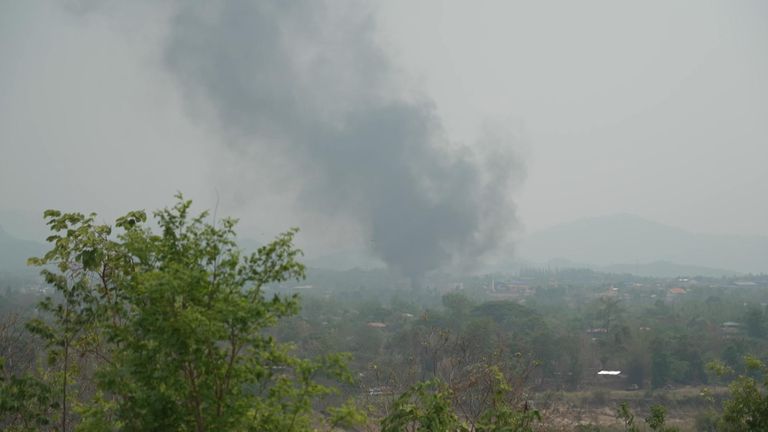
Mae Tao clinic in Mae Sot, a frontier town along the border with Myanmar, is a harrowing window into a civil war that has suddenly escalated.
In the searing heat of early morning, the wards are packed full of patients, some with catastrophic injuries.
We walk into a room full of amputees, many recently injured by airstrikes and landmines.
Lying on a bed with his stomach held together by a bandage, we meet Maung Maung.
His voice is incredibly strained, and he can hardly move. He's just lost his two daughters. One was two years old, the other 14.
"They were hiding in a school. I thought it would be safe. After the bomb, I saw the body of one of my daughters ripped apart," he tells us.
Many here say they're too terrified to return to their home country and that fighting is now a daily threat.
More on Myanmar

Resistance fighters claim they have taken key Myanmar border town from military

Aung San Suu Kyi's son receives handwritten letter from imprisoned former Myanmar leader after three years of silence

Rebels take key Myanmar city after government troops lay down weapons
Related Topics:
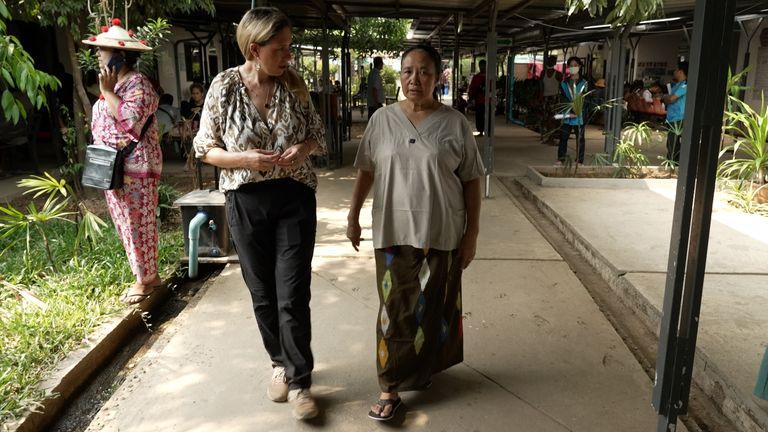
For decades, Dr Cynthia Maung, founder of the clinic in Thailand, has seen the graphic side effects of the world's longest-running civil war, a brutal clash between Myanmar 's military and a mix of pro-democracy groups and local ethnic rebel armies.
In recent weeks though, she says the number of patients coming to her almost doubled to 500 a day.
"This is the worst in my time in 35 years here. This is the worst situation," says Dr Maung.
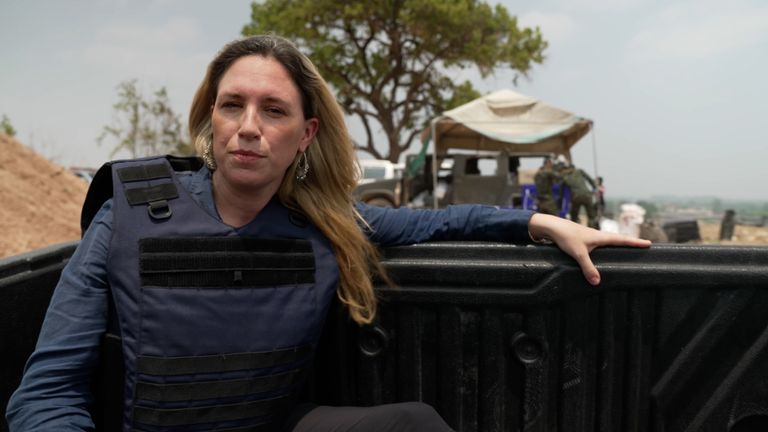
As we talk, there are patients of all ages. She is their great hope, but she's juggling increasingly complex and desperate cases.
There's recently been a sharp increase in those coming here wounded by bombs.
The embattled ruling junta has increasingly been carrying out airstrikes in the face of big losses. The resistance now controls more than half of Myanmar's territory.
One of the most symbolic defeats came two weeks ago in Myawaddy. The small town has an outsized economic role, known as the so-called "gateway to Thailand".
It has long been a focal point for many of the ethnic and pro-democracy groups, but rarely looked vulnerable.
Yet two weeks ago, rebel forces led by the Karen ethnic army made their move, stunning observers by taking the town.
Social media videos show the military seemingly launching an operation to retake it - but their convoy is ambushed, resistance fighters taking over their vehicles and sending them fleeing.
At the top of a hill on the Thai side of the border, the army is watching everything closely. There's a nervousness and tension that hasn't been there since the coup in 2021.
Read more: Myanmar junta 'deliberately bombing medical facilities' Myanmar's civil war has taken dramatic turn
Sub-Lieutenant Chuchat Farangtong tells me: "I felt the resistance groups were well prepared.
"There were signs before they attacked. My unit could see their manpower and their weapons. And there were civilians waiting along the river getting ready to cross over."
Now it seems control of the town could be shifting once again, with video emerging on Tuesday of a Junta soldier from 275th Battalion in Myawaddy raising their flag. Reports say fighters of the KNA faction, a Border Guard Force, allowed them through to re-establish control. We may well see more clashes ahead.
In the past few days alone, thousands have fled the fighting in Myanmar, many running away from conscription driven by a military desperately in need of more men.
Among them is 19-year-old Nyi Nyi, now in hiding in Thailand after secretly crossing the border - a terrifying journey that took three days.
"When I was fleeing, most of my friends got arrested by the military," he says.
"They were interrogated and tortured. They trained them for just three weeks and then sent them to the frontline."
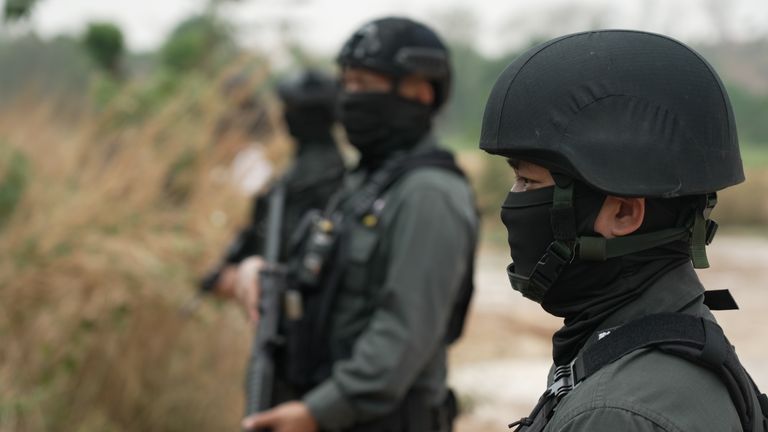
He claims opponents are being brutally attacked by a military desperate to cling to power: "They starve opponents, put them in stress positions and beat them until they bleed from their ears."
The ruling junta did not respond specifically to questions about Nyi Nyi's allegations. But they said "pro-terrorist groups" had used "excessive force" to attack Myawaddy in April, and that security forces were "working hard to maintain law and order and regional stability".
Myanmar's military government has been losing ground in its borderlands for months, as pro-democracy militias and ethnic armed groups have launched a series of successful offensives.
That's been made possible by previously disparate groups coming together.
It is unlikely the ruling military government is at risk of being overthrown imminently, but we haven't seen a shift like this for years.
That's a challenge for neighbouring countries trying to navigate their relationship with Myanmar, the creeping violence on the border areas and the exodus of Myanmar's people.
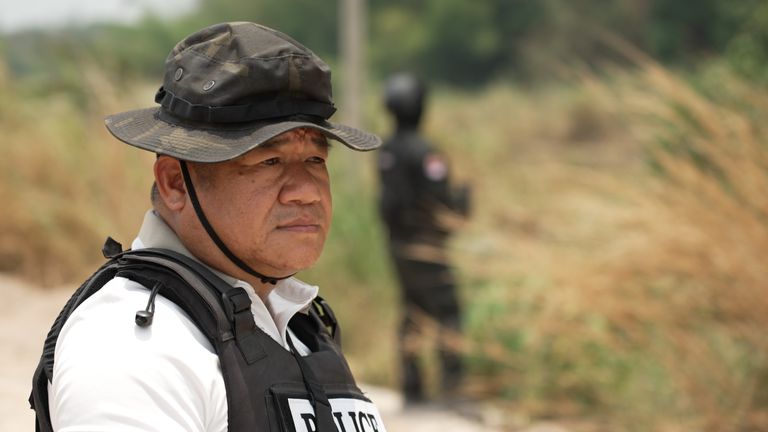
We went on patrol with the Thai police who seem to be trying to play the role of protector and enforcer, helping some find refuge and detaining others.
They tell us they've arrested up to 30 people trying to cross illegally into Thailand every day.
"I'm worried that the bullets are flying to the Thai side," Lieutenant Manop Sivadumrong says.
"So, we've deployed border police and provincial police along the border to prevent illegal migrants and to help the Myanmar people on both sides in case they are injured."
It is a delicate balance for them and many other countries - one by-product of a conflict many have ignored.
Be the first to get Breaking News
Install the Sky News app for free

Keep up with all the latest news from the UK and around the world by following Sky News
But the international community is slowly waking up.
And a splintered state will likely reap havoc on innocent civilians and continue to spill across national borders.
Related Topics
You are using an outdated browser. Upgrade your browser today or install Google Chrome Frame to better experience this site.
Need travel vaccines? Plan ahead.
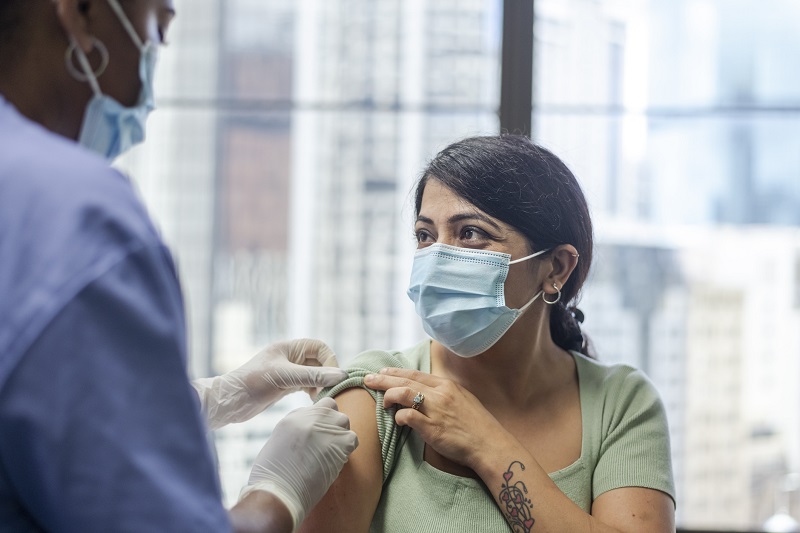
International travel increases your chances of getting and spreading diseases that are rare or not found in United States. Find out which travel vaccines you may need to help you stay healthy on your trip.
Before Travel
Make sure you are up-to-date on all of your routine vaccines . Routine vaccinations protect you from infectious diseases such as measles that can spread quickly in groups of unvaccinated people. Many diseases prevented by routine vaccination are not common in the United States but are still common in other countries.
Check CDC’s destination pages for travel health information . Check CDC’s webpage for your destination to see what vaccines or medicines you may need and what diseases or health risks are a concern at your destination.
Make an appointment with your healthcare provider or a travel health specialist that takes place at least one month before you leave. They can help you get destination-specific vaccines, medicines, and information. Discussing your health concerns, itinerary, and planned activities with your provider allows them to give more specific advice and recommendations.
Because some vaccines require multiple doses, it’s best to see your health care provider as soon as possible.
Medicines to prevent malaria are pills that you start to take before travel. Take recommended medicines as directed. If your health care provider prescribes medicine for you, take the medicine as directed before, during, and after travel.
Where can I get travel vaccines?
You may be able to get some travel vaccines from your primary healthcare provider. If you or your healthcare provider need help finding a location that provides certain vaccines or medicines, visit CDC’s Find a Clinic page.
If yellow fever vaccine is recommended or required for your destination, you’ll need to go to a vaccine center authorized to give yellow fever vaccinations. Many yellow fever vaccine centers also provide other pre-travel health care services. Find an authorized US yellow fever vaccine center .
Examples of Vaccines
Here is a list of possible vaccines that you may need to get for the first time or boosters before you travel.
- Cholera
- Flu (Influenza)
- Hepatitis A
- Hepatitis B
- Japanese encephalitis
- MMR (Measles, Mumps, Rubella)
- Meningococcal
- Pneumococcal
- Polio
- Rabies
- Tdap (Tetanus, Diphtheria, Pertussis)
- Typhoid
- Yellow fever
More Information
CDC Yellow Book: Travel Vaccine Summary Table
File Formats Help:
- Adobe PDF file
- Microsoft PowerPoint file
- Microsoft Word file
- Microsoft Excel file
- Audio/Video file
- Apple Quicktime file
- RealPlayer file
- Zip Archive file
Exit Notification / Disclaimer Policy
- The Centers for Disease Control and Prevention (CDC) cannot attest to the accuracy of a non-federal website.
- Linking to a non-federal website does not constitute an endorsement by CDC or any of its employees of the sponsors or the information and products presented on the website.
- You will be subject to the destination website's privacy policy when you follow the link.
- CDC is not responsible for Section 508 compliance (accessibility) on other federal or private website.

IMAGES
VIDEO
COMMENTS
Thai Travel Clinic is a special clinic of Hospital for Tropical Diseases, Faculty of Tropical Medicine, Mahidol university, Thailand. We provide comprehensive medical care for both Thai and Foreign travelers. Our services include: pre and post travel counseling, recommendation of travel vaccines, malaria protection and prophylaxis as well as ...
Location. Travel Medicine Center. Building A, 15 th floor, Station A and C. Rating score 8.31 of 10 , based on 39 vote (s) Up to date recommendations including appropriate immunizations, preventative medications, and expert advice on precautionary measures for your destination.
Dosing info - Hep A. Hepatitis B. Recommended for unvaccinated travelers younger than 60 years old traveling to Thailand. Unvaccinated travelers 60 years and older may get vaccinated before traveling to Thailand. Hepatitis B - CDC Yellow Book. Dosing info - Hep B. Japanese Encephalitis. Recommended for travelers who.
Global Healthcare Accreditation. With a focus on medical travel care, the Global Healthcare Accreditation (GHA) Program sets the standard for healthcare organizations serving medical travel patients. 1378 (Thailand Only) Available 24 hours every day. Call Bumrungrad. +66 2066 8888.
Thai Travel Clinic, located in Bang Bon, Bangkok, Thailand. Their focus and expertise are spread across just a few procedures, with 2 procedures available to patients across 1 specialties. The Clinic is yet to be reviewed by MyMediTravel customers. Thai Travel Clinic is a little limited in its offerings, and is well catered to international ...
Thailand is a popular destination with its tropical climate, food, culture and seasides. Thai is the official language of Thailand. But, other smaller languages spoken in rural areas. ... schedule an appointment with your local Passport Health travel medicine clinic. Ring us up at or book online now and protect yourself today.
Thai Travel Clinic - Hospital for Tropical Diseases - Overview. Our Travel Clinic is part of the Hospital for Tropical diseases, Faculty of Tropical Medicine, Mahidol University. We are specialized in Travel Medicine and Tropical diseases especially malaria. Our services include: pre and post travel counseling, vaccination and immunization ...
Thailand Travel Requirements & Vaccinations . Thailand is a country located in Southeast Asia on the Indochinese peninsula. Officially known as the Kingdom of Thailand, it was formerly known as Siam. Thai is the official language of Thailand with English being spoken in most of the larger cities and tourist destinations. Thailand is home to ...
8.00-15.00 (BKK Time) Contact center +662 066 8888 and 1378. Rating score 0 of 10 , based on 0 vote (s) FBLiveVDOblog Health-Checkup. After months of lockdown and travel restrictions, we are glad that medical and tourist visa is finally available to enter Thailand. No quarantine option for fully vaccinated travelers is also possible.
Advice. Travellers'. Diarrhea Kits. Available. Thailand is a popular destination with its tropical climate, food, culture and beaches. Thai is the official language of Thailand. But, other smaller languages spoken in rural areas. The primary religion of Thailand is Buddhism and is prevalent in many aspects of culture throughout Thailand.
Treatment is quite reasonably priced, often being cheaper than identical treatment abroad (especially if you come from a country that doesn't have national health care: looking at you, America). BNH Travel Clinic. BNH Hospital, 9/1 Convent Rd. T: (02) 686 2700. Open Mon-Sat, 08:00-17:00 and Sunday.
6. Identify nearby pharmacies. 7. Carry a list of emergency contacts. 1. Research hospitals and clinics. Photo via Freepik. Before arriving in Thailand, research various hospitals and clinics in the area you will be visiting. This will help you have a better understanding of the available healthcare options.
In 2005, a travel clinic was opened and in 2012, a fever clinic. In 2013, the new 'Rajanagarindra' Building was opened by Princess Maha Chakri Sirindhorn and a "Trop Med Home Care" service was introduced to provide health care services for the elderly at home. See also. Health in Thailand; Healthcare in Thailand; Hospitals in Thailand
Vaccinations and health risks. At least 8 weeks before your trip check: Health risks in Thailand include: See the 'Other risks' section of the TravelHealthPro Thailand guide for more on health ...
Travel Medicine Clinics. If you want to see a travel medicine specialist, the International Society of Travel Medicine (ISTM) can help you find a clinic. Directory of travel clinics. Yellow Fever Vaccination. If you need yellow fever vaccine you must get vaccinated at an authorized yellow fever vaccine clinic. Many of these clinics also give ...
Medical Travel; Packages; Insurance. Insurance We Accept; ... Home Clinics and Centers Travel Medicine Center. Information Conditions Treatments Doctors. ... Rating Score: of 10, Total Vote: Related Health Blogs 1378 (Thailand Only) Emergencies - Appointments - Ambulance. Available 24 hours every day. Call Bumrungrad +66 2066 8888 ...
Thailand is a destination for tourists seeking sex (see Sec. 9, Ch. 12, Sex & Travel). Although commercial sex work is illegal, it is practiced in many places in Thailand. Visitors to Thailand's red-light districts should be aware that these areas have been associated with human trafficking.
You should visit a travel clinic 6 - 8 weeks before your trip to ensure that you will be able to get all vaccinations you need in time. ... Thailand is the most popular travel destination in Asia, with over 16 million visitors enjoying its beaches, mountains and busy cities every year. Whether you are planning a holiday for the whole family or ...
1378 (Thailand Only) Emergencies - Appointments - Ambulance. Available 24 hours every day. Call Bumrungrad. +66 2066 8888. Available 24 hours every day. Map and Directions. Get Directions. JCI Accredited International Hospital Named Top 10 World Medical Destination (Newsweek), Best Quality Service and Top 4 Medical Tourism Pioneer (WSJ) - Thailand.
Thailand Healthy Travel Packing List. Pack items for your health and safety. You may not be able to purchase and pack all of these items, and some may not be relevant to you and your travel plans. ... Hospitals or clinics (including emergency services) in your destination; US embassy or consulate in the destination country or countries; Top.
However, even if time is short, an appointment is still worthwhile. This appointment provides an opportunity to assess health risks taking into account a number of factors including destination, medical history, and planned activities. For those with pre-existing health problems, an earlier appointment is recommended.
For decades, Dr Cynthia Maung, founder of the clinic in Thailand, has seen the graphic side effects of the world's longest-running civil war, a brutal clash between Myanmar's military and a mix of ...
Zentrum für Reisemedizin. Building A, 15 th floor, Station A and C. Rating score 8,38 of 10 , based on 37 vote (s) Up to date recommendations including appropriate immunizations, preventative medications, and expert advice on precautionary measures for your destination.
Learn which vaccines are recommended and required for travel. ... visit CDC's Find a Clinic page. If yellow fever vaccine is recommended or required for your destination, you'll need to go to a vaccine center authorized to give yellow fever vaccinations. Many yellow fever vaccine centers also provide other pre-travel health care services.